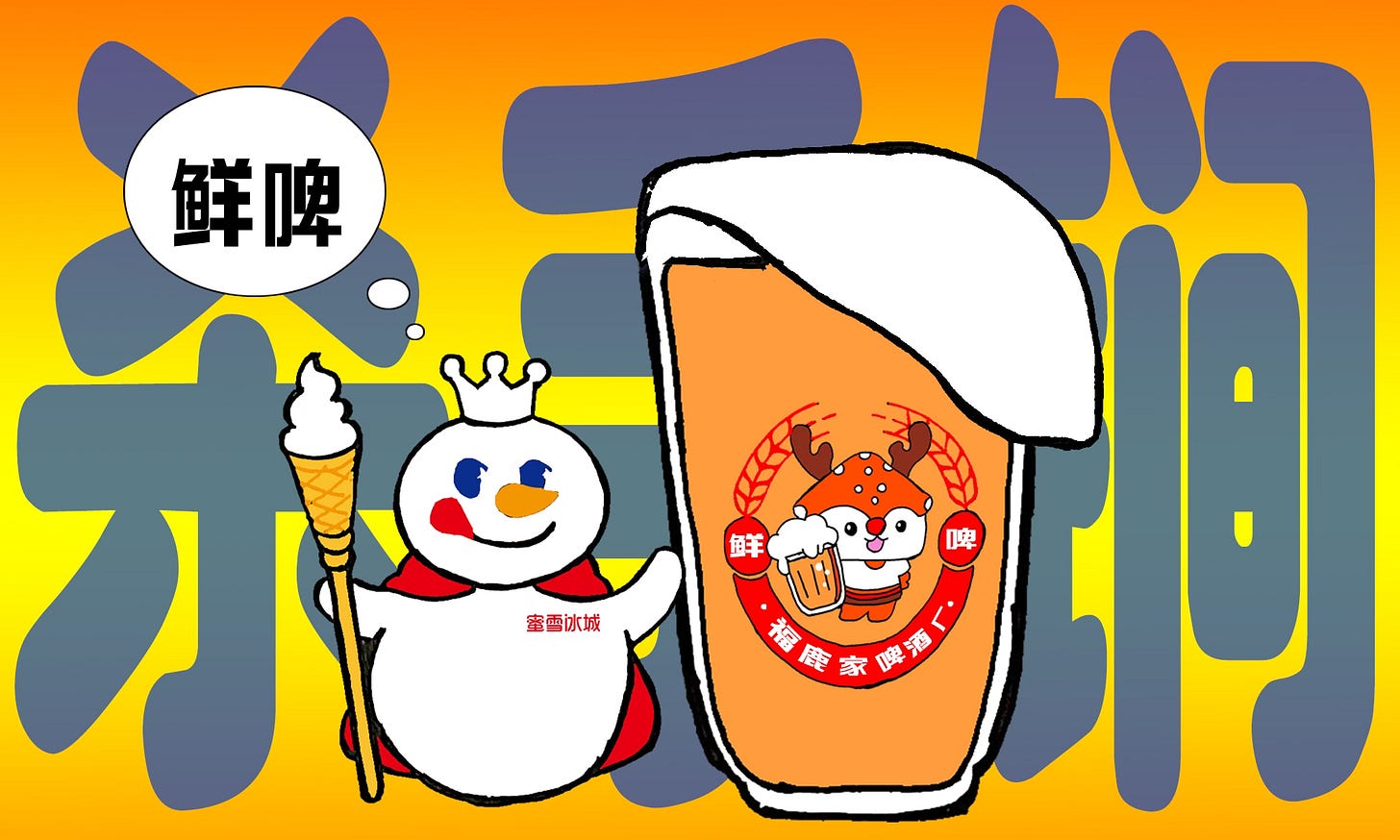
Our phrase of the week is: “killer move” (杀手锏 shā shǒu jiǎn)
Context
China’s biggest bubble tea giant just made a bet on beer.
The company is Mixue Bingcheng (蜜雪冰城) is known for its affordable milk teas, fruit teas, ice cream, smoothies, and bubble teas at affordable prices typically ranging from 3 to 8 yuan.
On October 9, Mixue announced it was acquiring a 53% stake in Fu Lu Jia (福鹿家), a craft beer chain, for 297 million yuan (41.8 million USD). The news sent Mixue’s stock soaring 18.45% over just six trading days, adding 26.3 billion Hong Kong dollars (3.39 billion USD) to its market value.
Fu Lu Jia fits Mixue’s playbook perfectly. Both companies target budget-conscious consumers with low pricing — Mixue’s signature products are around 6 yuan, while Fu Lu Jia beers range from 5.9 to 9.9 yuan per jin (around one pint, or about half a liter).
While pricing is aggressive, freshness is the differentiator for Fu Lu Jia:
Fu Lu Jia bets on freshness to challenge canned beers sold in supermarkets at a comparable price point. This “fresh-over-pre-packaged” strategy is the company’s killer move.
福鹿家将”新鲜现制”作为卖点,剑指超市同等价位一罐的”水啤”。用现制”碾压”预制,是公司的杀手锏。
Fú Lù Jiā jiāng “xīnxiān xiànzhì” zuòwéi màidiǎn, jiànzhǐ chāoshì tóngděng jiàwèi yí guàn de “shuǐ pí”. Yòng xiànzhì “niǎnyā” yùzhì, shì gōng sī de shāshǒujiǎn.
And with that, we have our Sinica Phrase of the Week.
What it means
“Killer move” (杀手锏 shā shǒu jiǎn) is a three-character phrase that literally translates as “killing” (杀 shā), “hand” (手 shǒu), “mace” (锏 jiǎn). A mace is an ancient Chinese weapon — a long metal club with four ridges used for striking rather than cutting.
This phrase originally referred to a secret finishing move using a mace weapon in classical martial arts novels.
The term comes from Tales of Tang (说唐全传), a Qing Dynasty novel about legendary warriors. Written by an unknown author, it became one of the most popular historical romance novels in China, dramatizing the founding of the Tang Dynasty.
In Chapter 9, the story describes how Qin Qiong (秦琼), a famous Tang Dynasty general, teaches his martial arts techniques to his cousin Luo Cheng (罗成).
Qin Qiong passes on move after move, but when he reaches his ultimate technique — the “killer mace” — he hesitates:
“Should I really teach him this? My cousin is so fearless and skilled. If I teach him the killer mace, he’ll be unmatched in the world, and there’ll be no place left for me.”
不要吧,表弟勇猛,我若传了他杀手锏,天下只有他,没有我了。
Búyào ba, biǎodì yǒngměng, wǒ ruò chuán le tā shāshǒujiǎn, tiānxià zhǐyǒu tā, méiyǒu wǒ le.
So he held it back.
Similarly, Luo Cheng taught Qin Qiong his spear techniques — the “returning horse spear” (回马枪) — but withheld his own secret move. Both warriors kept their ultimate techniques hidden, only revealing them later in actual combat when absolutely necessary.
The phrase was originally written as 撒手锏 (sā shǒu jiǎn) — “releasing hand mace” — emphasizing the act of throwing the weapon at a crucial moment as a surprise attack. By the late 19th and early 20th century, it evolved into the modern form 杀手锏 (shā shǒu jiǎn), shifting the emphasis from “releasing” to “killing.”
Today, the phrase extends far beyond martial arts. In military contexts, it refers to game-changing weapons or technologies. In business, it describes a company’s secret competitive advantage, trump card, or decisive tactic.
For Mixue, its move into draft beer is exactly that: the killer move that sets it apart from competitors. While other beer brands compete on packaging and marketing, Mixue’s new brand delivers fresh-from-tap craft beer beats the pre-packaged competition on taste and experience — all while keeping prices low.
Andrew Methven is the author of RealTime Mandarin, a resource which helps you bridge the gap to real-world fluency in Mandarin, stay informed about China, and communicate with confidence—all through weekly immersion in real news. Subscribe for free here.
Read more about how this story is being discussed in the Chinese media in this week’s RealTime Mandarin.



